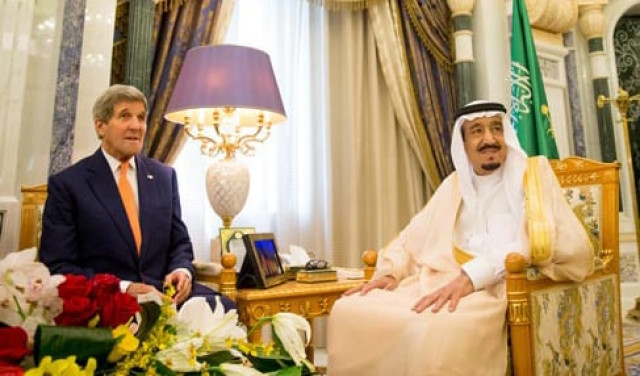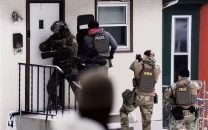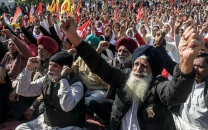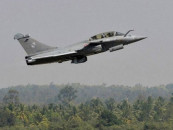Saudi Arabia offers five-day Yemen ceasefire
US Secretary of State John Kerry welcomed the proposal

US Secretary of State John Kerry (L) meets with Saudi King Salman at the Royal Court, Thursday, May 7, 2015, in Riyadh, Saudi Arabia. PHOTO: REUTERS
International concern about Yemen's dire humanitarian situation has grown as fighting, airstrikes and an arms embargo have led to civilian deaths, internal displacement, destruction of infrastructure and shortages of food, medicine and fuel.
Read: UN imposes arms embargo targeting Yemen Houthis
"The pause will affect all of Yemen for a period of five days," Saudi foreign minister Adel al-Jubeir said. "The actual date will be announced shortly as well as the requirements.
"This is all based on the Houthis complying with the ceasefire."
The offer of a truce comes days after the Houthis started shelling Saudi border towns, prompting renewed airstrikes in Yemen, and as the militia advanced into a last central area of Aden, a city whose fate is seen as pivotal to Yemen's civil war.
Read: Yemen rebels shell Saudi town, prompting warning
At a news conference alongside Jubeir, US Secretary of State John Kerry welcomed the proposal and said neither Riyadh nor Washington was talking about sending ground troops to Yemen.
Saudi Arabia's military spokesperson had said late on Wednesday that all options were open, including ground operations, to stop the mortar attacks on its border towns.

US Secretary of State John Kerry, left, meets with Saudi Foreign Minister Adel al-Jubeir, right, at the Saudi Ministry of Foreign Affairs, in Riyadh, Saudi Arabia, Thursday, May 7, 2015. PHOTO: REUTERS
"We particularly welcome a new Saudi initiative to try to bring about a peaceful resolution through the announcement of their intent to establish a full, five-day, renewable ceasefire and humanitarian pause," Kerry said.
"This ceasefire is conditioned on the Houthis agreeing to live by these same commitments."
The United States has supported the Saudi-led coalition which began strikes against the Houthis and forces loyal to ex-president Ali Abdullah Saleh on March 26 with the aim of restoring the government of President Abd-Rabbu Mansour Hadi.

People on a motorcycle pass a police headquarters destroyed by a Saudi-led air strike in Yemen's northwestern city of Saada on Thursday. PHOTO: REUTERS
Riyadh fears the Houthis, who are allied to its foe Iran, will dominate the kingdom's southern neighbour, and that the advance of their Shia Muslim fighters into Sunni areas will provoke sectarian fighting that al Qaeda can exploit.
Iran has denied Saudi and Yemeni government charges it arms and trains the Houthis. Kerry said he was "very, very concerned" by Iranian activities in Yemen, Iraq and elsewhere and would discuss the issue with Gulf allies.
Continued fighting
A second night on Wednesday of air raids to suppress further Houthi shelling struck the group's stronghold of Saada, near Yemen's Saudi border, and the small port of Maidi.
On Thursday, Houthi-linked Al-Masirah TV showed fighters in a key district of Aden, and reported that the southern port city's presidential palace was in their hands.

Wreckage of a Yemeni air force aircraft on May 5, 2015 after an airstrike on rebel-controlled Sanaa airport by the Saudi-led coalition PHOTO: AFP
In a letter addressed to United Nations, the Houthis called for international action to stop what they described as Saudi aggression and crimes against the Yemeni people.
Villagers from Yemen's northern Hajah province say many residents have left their homes because of the Saudi bombardment and are seeking refuge in other areas where they lack food.
Most of those displaced are from the Haradh district where there is an important border crossing with Saudi Arabia and which has come under heavy artillery and air attack since the Houthis launched shells from the area at Saudi villages.
Earlier, the Houthis said they had shelled a Saudi air defence facility north of Najran after killing eight people in the town on Tuesday and Wednesday. Another two Saudis were killed by Houthi shells in Jizan province.
The Arab coalition has been wary of putting boots onto the ground in Yemen, keenly aware of the difficulties of tackling a well entrenched guerrilla army in its own mountainous terrain.
More than 100 Saudi soldiers were killed during a 2009-10 border war between the kingdom and the Houthis, which included ground fighting in frontier villages. Ten Saudi troops have been killed in the current conflict.
A Saudi Apache helicopter was damaged in an emergency landing near the border on Thursday, a Gulf official said, denying an earlier report by al-Masirah that the aircraft had been shot down by the Houthis. He said the pilots were safe.
Kerry meeting
Fighting across Yemen killed 120 people on Wednesday, mostly civilians, including at least 40 who were trying to flee Aden in a boat that was struck by Houthi shells, rescue workers and witnesses said.
During his visit, Kerry also discussed a May 13 summit in Washington with oil-rich Gulf states and talks on curbing Iran's nuclear programme, a senior State Department official said.
The summit will discuss a regional defence system to guard against Iranian missiles and allay anxieties over any nuclear deal with Tehran, US officials said. The offer could be accompanied by enhanced security commitments, new arms sales and more joint military exercises.



















COMMENTS
Comments are moderated and generally will be posted if they are on-topic and not abusive.
For more information, please see our Comments FAQ